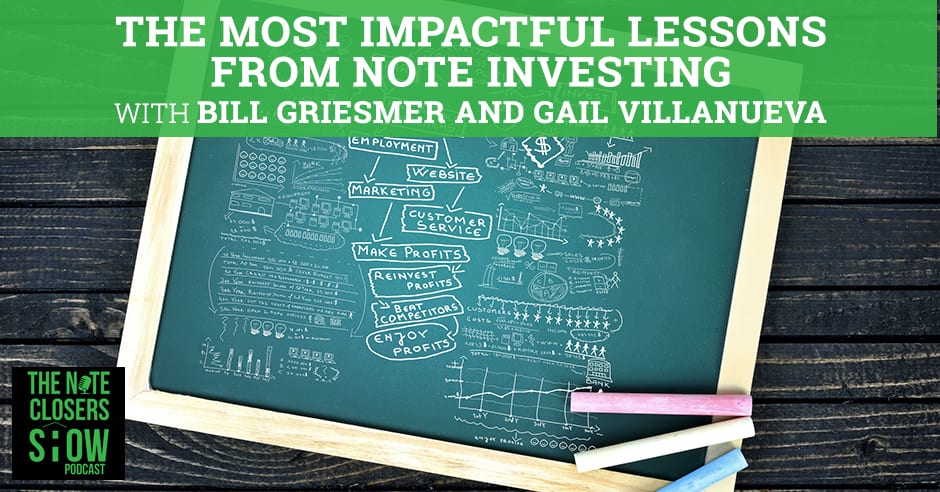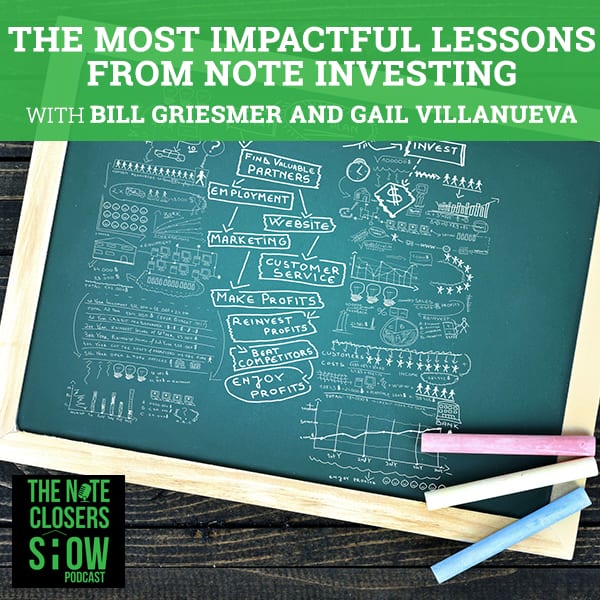
It’s very easy to look at other real estate investing sometimes as a zero sum game where I win, you lose, or vice versa. That’s not always the case in notes. In the note business, you can positively help someone’s lives at the same time that you can earn a return for yourself and a return for your investor. Another thing is there’s a very high degree of camaraderie. You meet and work with a lot of interesting people who are very eager to help you and willing to talk with you and might give you some advice here and there. Furthermore, you don’t have to go out and leave your home all that time to be doing a lot of this work. At the same time, not everything is sunshine and rainbows. There are difficult things that some people could consider negative about the note in business. Learn about the most impactful lessons from note investing from note investors Bill Griesmer and Gail Villanueva.
—
Listen to the podcast here
The Most Impactful Lessons From Note Investing with Bill Griesmer and Gail Villanueva
My name is Bill Griesmer. I am a note investor. I’m a student and friend of Scott Carson, who is the normal host of this show. It’s my pleasure to introduce to you Gail Villanueva. She’s a note investor with us also from the WCN Crew.
Hi.
Gail and I were talking to each other about what we were going to talk about now. We thought we would start with some positive things about the note business, things that we like, things that drew us to it. We might get into a little bit how we started, but at least for me, one of the most positive things that I can think of about the note investing, a big reason why I wanted to try this route of real estate investing versus others, is that you have the opportunity to be a part of and execute a win-win scenario. What I mean by that is if you buy a house and it’s maybe a borrower that had hard times, that had something bad happen in their life, when you are the bank, it gives you a lot of control and a lot of say so over what’s going to happen there. When things work out well, there is an opportunity for a win-win scenario. You can come out of a situation and a business decision like that where you buy a note and if you’re able to either reinstate the notes or you’re able to modify the notes, you can end up with a happy borrower. Someone that is truly grateful for your services and someone that is happy to be staying in their house.
This is something I’ve seen online by a number of my friends. I believe it was Chad Urbshott who posted this handwritten note from this borrower that he had. He was able to execute a strategy to try to keep this borrower in her house. At the same time, you can actually make a good healthy return doing this. It’s very easy to look at other real estate investing sometimes as a zero sum game where I win, you lose, or vice versa. That’s not always the case in notes. I do like the fact that you can positively help someone’s lives at the same time that you can earn a return for yourself and a return for your investor. Gail, your thoughts on that.
That’s one of the most gratifying things is to be able to help people because you now control the paper on it. In a lot of cases, people don’t want to lose their home. We have the option and the ability to go in there and try to modify or whatever. There’s also occasion where folks just don’t want to, for whatever reason. They’re not able to or they want to move in with family, they got ahead over their selves or something. We give them the opportunity to bow out gracefully and work something out. In my business model, I don’t think they are credit. I want to try to keep them in this as intact as possible. You are absolutely right on that, Bill.
Another thing that I like about note investing, I was a landlord for a very short period of time. My brother and sister and I had two houses. My father passed away and we decided to rent them out. What could go wrong?
I can tell you what could go wrong. I have tenants right now. I still have twelve doors in my portfolio, so I could tell you how many things can go wrong.
The point is we didn’t do it for long, just under two years. Since neither my brother nor sister nor I, none of us lived close to where the houses were, we did decide to hire a management company. I thought that would make it a completely no muss, no fuss but that just was not the case. Part of it was the location. This was up in Northeast Ohio where it snows quite a bit. We ended up paying a lot extra for snow removal. I don’t know for sure if we had to do that, but on the other hand, the driveway had a very steep descent onto a busy road. I didn’t want the renters sliding down a steep, icy driveway. Even the management company for example, I found out from the neighbor that one of the people had a dog. I sent the management company to talk with them about it and somehow I got a phone call a couple days later from the renter that the management company had kicked him out. I had to go back and fix the situation. I had to say, “We’re going to work something out,” because in the midst of all that, I was negotiating to sell the houses. If I was to try to sell the house, it had more value with a renter in it.
My point is landlording is far from passive income. Even if you use a management company, it’s not passive income. However, once you get a note to a performing stage, I can’t say it’s no activity or effort, but it is the closest thing to passive income that a lot of times you people are going to find. I do have a couple of performing notes and it is money that shows up. I have one that just does show up in my mailbox so I do have to go out and get it, but the other one is just direct deposit. It goes straight into my bank account. Especially if you buy a nonperforming notes, you need to work that. That does take some effort, but once you get to the point where a note is performing, there’s not a lot of activity to it. Right, Gail?

Lessons From Note Investing: Landlording is far from passive income. Even if you use a management company, it’s not passive income.
I absolutely agree. I have a couple of horror stories too, on being a landlord, which is one of the reasons I got out of doing the hard asset as we call it in real estate. We have hurricanes here in Central Florida. I was getting ready to go on vacation overseas to Europe and ended up, I called all of my tenants. We’re self-managing some of our units, and said, “I’m going out of the country.” “No problem.” I kept an international calling plan just in case. I get a call from one of the tenants, we’re about four or five days into the trip, and she goes, “The roof’s leaking.” This was after Hurricane Matthew. We’ve got nailed pretty hard with Matthew. I said, “How long has it been leaking?” She goes, “A couple of weeks.” I said, “When I was still in the US?” She goes, “Yes.” I started calling around for roofers. I have roofers on my team and they were like, “We’re busy right now.” It ended up that they went out to just mitigate it. Tenants, toilets and trash is what they talk about and it can be a nightmare. The note business avoids all of that unless we take it back for whatever reason.
Another thing I like about the note business is there’s just a very high degree of camaraderie. You meet and work with a lot of interesting people. Scott Carson, he has a very fascinating background. Wayne Snell, the situation in the background that he came from working in a very busy, very stressful corporate job. Even you yourself, Gail, with a background literally a rocket scientist, me as a physical therapist. I rehab people and now I’m rehabbing notes and homes. You can meet some interesting people. Furthermore, people are very likely to help you. There’s not a lot of sense of, “I’m secretive and I’m not going to tell you anything. Go away. Shoo away. I’m not giving you anything to try to work with.” Pretty much every note investor that I’ve ever talked to, they’re pretty friendly, willing to talk with you and might give you some advice here and there. One of the biggest things I get is, “Please let me know if I can help you.” That spirit, that attitude carries through that je ne sais quoi. That’s one of the things that I like about note investing. How about you?
I agree. For example, we called Miss Katie Moton, “Katie, help. We’re trying to get on,” and she jumped right on. We’ve got to give a big kudos to her for helping us out this morning with the technology. I found that if I come across a unique situation or something, I’m still questioning as far as running the note business, everybody’s just a phone call away, different time zone sometimes, but we’re all here to help. I love that about us.
I had the pleasure to speak at a real estate meeting, the REIA here in Columbus, Ohio. We had a good turnout, probably 100 people, 150 people. Vena Jones-Cox, she is brilliant. I love learning from her. She was talking about wholesaling. She mentioned this. I’ve heard her speak a number of times before. With wholesaling, you’re going to want to go and look out at a number of homes before you find one that will work for what it is you’re trying to do. You don’t have to do that as much with note investing. A lot of times, many note investors can make an income, can make a return on a property that they never even actually set foot inside. They never looked at it.
Generally, it is by far our best practice to hire someone to go out and take a look at it and make sure you’re getting eyes on the property, but a lot of the work actually can be done at home, whether you’re looking at a spreadsheet, a type of what we call a tape in the note investing business, or whether you’re finding realtors to call or ordering BPOs from a title company. You end up using the same couple of vendors. It’s a lot more practice to it. I hesitate to say checklist because every note is a little bit different especially if you don’t have a backup there or a team there. My point is you don’t have to go out and leave your home all that time to be doing a lot of this work. That’s another thing I like, Gail. Have you found the same?
I have. Working with wholesalers, coming from a rehab background and also as a realtor, we deal with fair market value when we’re dealing with notes. They’re dealing with after repair value. You segued and mentioned it a little bit there. We can actually help wholesalers because if we have something in our inventory, we could go nationwide to put it out to a REIA and say, “I’ve got this property. I’m a note investor. I will even be the hard money lender on that side while you do the rehab if you want,” and work it out something like that. Inventory is very tight. I worked intimately a lot with wholesalers being a rehabber. If we can provide them inventory, they’re going to be happy with it. In often cases, we had a different calculation altogether when we dealt with our after repair values. Usually, there’s enough for everybody and enough to go around, so it’s volume for us. It’s not so much for them. If I was doing a rehab every month, once a month, that’s twelve. We can do twelve notes far greater in a year.
Those are some positive things about the note business. At the same time, we don’t want to pretend like everything is sunshine and rainbows, as the great Rocky Balboa once said. There are some difficult things that some people could consider negative about the note business. One of the biggest ones I get from other people right off the bat is sometimes you might have to foreclose, sometimes people might have to leave their homes. That is the case. That’s always the option of last resort. Personally, I’d never do, although it is a legitimate exit strategy for people to have. Sometimes, as a last resort if a borrower just either will not pay, they will not work with you, or they just absolutely cannot afford a home, or they’ve just moved on with their life, there could be a whole host of reasons, sometimes you might have to foreclose. Some of my friends have asked me about that. How does that make you feel? I can’t say it makes me feel great, but everybody has stuff that goes wrong in their lives. People lose jobs.
Especially if we buy a non-performing note, sometimes they might have been there for up to a year completely rent-free with no payments or anything depending on the house that might be worth, $6,000, $10,000. They’ve lived completely free someplace for a year. That’s worth something. It’s not like we’re taking everything and leaving them with nothing. A lot of times, we’ll even offer something like a Cash for Keys, which gives them at least a little bit of money that they can go out and either rent an apartment or rent another house or what have you. I just don’t think it’s fair to assume that if someone bought a house and even if they paid on it for a couple of years, if you don’t continue to pay, there’s nothing in the world that I don’t think morally or ethically says you should be able to continue to stay in that house forever rent-free. I’m not trying to rationalize or justify it, but that is a way that I look at it, Gail. How about you?
I have a motto, “If you don’t pay, you don’t stay.” Tenants should expect that. You’re talking about foreclosing and having to disrupt people’s lives. In real estate, that happens too. It’s not just inclusive to the note business where you’ll have folks that run into hard times and have to sell their house or you get foreclosed on either as owning the paper or you get closed upon and then someone has to deal with getting the house sold. I’ve seen it both ways. I’ve worked sure sales, I’ve worked foreclosures, and auctions. There are a lot of different things that happen. You’re right with that feeling of the foreclosure, but I don’t like to be backed into a corner. If somebody stopped paying me, the options are and let them stay for free, which I can’t and shouldn’t, or you just let them go ahead and get on with their lives. I prefer the latter if we’re at a point of no return where they can’t stay.

Lessons From Note Investing: If you don’t pay, you don’t stay. Tenants should expect that.
Another thing about the note business, although this is true of a lot of real estate investing in general right now, for the last several years, the economy and the real estate business especially has been improved significantly. Finding inventory for non-performing notes, it is getting harder and harder to do all the time. A couple of years ago when I was first getting into this, I heard that there’s going to be this big tsunami of non-performing notes and that may be the case. You still see sales from Fannie Mae or Freddie Mac where they’ve started to sell off some of their non-performing notes, but finding inventory can be difficult.
It can take a lot of legwork, for example, trying to buy from banks. It can be done certainly. Joe Bayarena and Jamie Kubiak proved it. They’ll even tell you it took a lot of homework for them to get there. As far as I’m concerned, they earned it with all the effort they put into it. It can take a lot of legwork to find inventory. You can find the low-hanging fruit Scott’s talked about on the online exchanges and such. It can be harder to find good deals there sometimes. In general, note investors, we do have to look around for inventory sometimes just the way your landlords do or your fix and flippers do.
You and I both specialize in notes secured by real estate. They have notes that are property, boats, RVs, things that move. You and I both agree that we didn’t want to pursue that. There are other types of notes that are available. When you get down to the real estate notes, because we’re dealing with such a high-dollar value of an asset, both you and I are very diligent on our due diligence. We get down into the weeds and look and make sure that it’s going to be a solid deal. You and I both get tapes. We get hundreds and hundreds of assets on there. On the front end, it looks like, “I’ve got hundreds of assets.” I’ve talked to an investor just the other day. I said, “I’m going through a tape right now. It’s got about 650 assets on it.” He’s like, “That’s awesome.” He thought jackpot, but I explained to him, “Out of those, I may get ten or fifteen, maybe twenty, that I want to go ahead and put bids on because of the fact that we go through them with a fine-tooth comb, both you and I do. It may be a little bit too much but just to make sure that we get good solid deals to invest in.
Another thing I hear, and this isn’t just in note business, this is a lot of entrepreneurs. There is actually running the business of whatever you’re doing, the day-to-day aspects of note investing, and then there’s running the business, making sure your paperwork is done properly, making sure you’re accounting is done properly, making sure the bills get paid. That type of thing. It’s very important. They are in some ways two different things. This depends on the investor. There are some investors that do well with that, but I hear from a lot of folks that bookkeeping especially trips them up. That’s something that most people don’t enjoy doing. I know, I don’t. I make myself do it. This year I’m learning QuickBooks. The whole business administration aspect of being an entrepreneur can be very challenging. That’s been my experience.
I’ve started to outsource some things. I outsource my marketing. I had outsourced my bookkeeping and accounting. Everybody can learn everything, but if you want to scale, that’s when you have to start looking at what can you have other folks take over for you, even if it’s hiring a virtual assistant. There are two different aspects to this. You have what we consider the internal and the infrastructure and then you have the business side of everything where you have to go and find the assets and market and work with people and network and all that.
Two different sides of it. Once you get back an asset, we can anticipate about half the time we’re going to foreclose unfortunately, it’s just a general rule of thumb. What do you do at that point? Then you have to have an exit strategy for those? You have to always look at that. Getting into the minutia of do I want to worry about doing the monthly bank reconciliations? Do I want to try to learn the social media side when it doesn’t come easy to me? It doesn’t come as easy as it once did. The running of the business is a huge part and making sure that you’re successful in that regard.
Just remember, Gail and audience, this goes everybody. You don’t stop moving because you get old, you get old because you stop moving. I learned that at a course a couple years ago and it struck a chord with me. I’ve told that to my patients. Even on days I don’t want to go to the gym, I think of that in a couple of other things to try to get me going. Then lastly, as with any new activity that you’re doing, there can be a steep learning curve. This business is actually simple but it’s not easy. The concepts are simple. Most people are aware that if you’re buying something for half price, it’s probably a pretty good deal, but it’s not easy in the sense that you need to make sure that everything is how you thought it was. That ties right into what you were talking about.
There are a lot of moving parts with the note business. There are a lot of things that you have to be aware of. It’s like chess a little bit. You have to think when to move ahead. You don’t want to over-analyze things, but you always want to have some exit strategy with that. It’s a unique business. I’m lucky I come from a pretty solid real estate background, except throw that away when you’re talking about the note side. Some of it, you can play on it. My network on both sides has been exceptional.
Moving on here, between Gail and I, we came up with some of the most impactful things that we have learned, some of the most influential lessons that we have picked up. Think of this as words for the wise. The first thing right off the top of my head was the old President Reagan, “Trust but verify.” It’s okay to trust somebody, but you will be well-served by just taking a little bit and even if it costs you some money, just verify things. That’s verifying that a house is where they said it should be, double-checking the value of a house. That’s even double-checking the taxes are even if they say they owe $2,000, just double-check.
Double-check other note investors, what they tell you. Sometimes people, even if they truly mean well, they might not have a great understanding of something themselves and they might inadvertently give you the wrong infotrmation. Even in terms of your teachers, people that teach note investing or real estate investing, not everybody’s going to learn from everybody equally for whatever reason. Some people just click with some teachers and not others. Just in general, for a whole host of reasons and scenarios, just try to trust what you’re told but also verify. Don’t take anything at face value.

Lessons From Note Investing: You don’t stop moving because you get old, you get old because you stop moving.
I had a guy, just out of the blue just because of what I do every day. I’ve been putting myself out there, and Derek called and talked to me. He was just asking me some general questions about note investing. Partway through the conversation, he said he’s spoken with some other people and what I was telling him lined up with what he had heard. He said, “I hope that’s okay.” I said, “I don’t mind a single bit. If I was in your shoes, that’s probably something I would do.” It’s not a bad idea just to double-check what you’re being heard. If a couple people are telling you something, then that’s good. There’s not a guarantee, but there’s an increased chance that someone steered you in the right direction.
It is all the upfront work. We do a lot of upfront work when we’re sitting there just determining whether or not we’re going to take down a note or something. That helps you structure the deal. Doing the due diligence and doing a thorough due diligence and verifying everything from municipality violations, code violations, any liens that may be against the property. If there’s an IRS lien on how you go about putting that onto the borrower instead of the property itself, lots of different things to look at. One of the other things that I have found is you can’t get enough education. You can’t get enough knowledge in this business.
There are a lot of things changing, not only the structure of the note business itself, but what’s going on economically. We talked about the financial forecasts. I looked at Amazon. They have a fuzzy ball but they don’t have a crystal ball, so I don’t know what’s coming down the pike. You can anticipate and look at what you can see happening in the note business if there’s going to be more sub-prime or pre-primes. If you have a pulse, you can get a loan, which is exactly what happened back that caused the last crisis in 2008. The knowledge, the constant learning, I take about 10% of my income and put it back into my education and going to some of these seminars and learning networking. You can never get too much of that.
That ties in with what I was about to say. It basically reinforced exactly what she just said. This goes for note investing but also life, have a growth mindset. Always be learning. I strongly recommend the book Mindset by Carol Dweck. The whole point of this book is people that thrive in life look at everything as a learning experience. They’re willing to put themselves out there and fail. They use the example of immigrants that were coming to this country some time ago. They didn’t speak English and they were offered the chance to take an English-speaking class so that they would be able to do better. Believe it or not, the vast majority of the group that was offered this did not take the English speaking class. The author did the research. They were afraid of being exposed and afraid of not being shown that they are smart. That is something that would have greatly increased their chances of success if they had done something like that.
The point is just have a growth mindset and always be learning. No one in this world knows everything, even someone like Scott. He knows a tremendous amount about note investing, but Scott is actually a good example of this. He goes to conferences. He’s even told me, “I like to go to conferences where I’m not the smartest guy there.” He lives and breathes this and that’s something I do respect about him and it’s something I’ve learned in my life. Moving on here, “No one will fix your problems except for you,” except for the person in the mirror. Even if you take training from someone, you still have to actually do the work. It’s good to take someone’s advice, it’s good to act on it, but no one’s going to care as much about your problems in life as you. That’s an eye-opening thing. The only thing you can control in life is you. For most people, that’s a 24-hour a day, seven-day a week job.
You’re responsible for your safety, your health, your well-being, and what you do. It falls back onto that mindset if you want to succeed, sometimes you fail. The worst thing that can happen is that you choose not to pick yourself back up and move on or learn from your mistakes. Besides Scott, I have a lot of respect for him because not only is he a caring individual, but he’s caring about the people that he is mentoring is Tony Robbins, I love Tony Robbins. I’ve been a big fan of audio books for a long time. I’ve turned my car into a classroom. I’m always listening to different types of books, not always motivational books, but books on how to change how you think. Gail Greenberg and I were talking about this the other day. Your mind can’t understand the difference between your reality. It can’t make the difference between reality and what’s perceived. If you live it and believe it and know it and feel it and live it as if it’s happening, it becomes a part of you and you somehow manifest that.
Right along those lines then, we already talked quite a bit about due diligence. I don’t think we need to revisit that right now, but one or two other things is don’t expect things to be perfect, including you. Just about anybody, you have to struggle to succeed in the long run. You have to be willing to put yourself out there and accept that, “I didn’t do that perfectly.” Even my Notes Zone video, Gail, we talked about this when we were in Cape Coral. I didn’t do that perfectly. I did it pretty darn well, but I was personally aware of a couple small ticks I had where I just missed my beat by just a little bit. People didn’t even notice. Don’t expect things to be perfect, including yourself.
That’s going to be one of those ones that live on in infamy. The way you did it, the way you pulled it off was absolutely brilliant. The fact that you did it live was even more amazing. It’s like Eric with his “Did You Knows” or Cody with his strolls. You’ve got to love them. I hope to emulate you with my Sunday Noteworthy Nuggets. I’ll get there eventually.
The last thing is you want to know when to ask for help and be willing to act on advice. I had a very problematic property. Wayne Snell was nice enough to talk with me about it. I have only myself to blame. I didn’t immediately execute his thoughts and recommendations, which he was nice enough to do that. In the long run, that ended up being exactly what I had to do. What can I say? I only have myself to blame. I should have acted on that a little bit sooner. It didn’t take a long time now, just a couple months, but let’s face it, time is money. That’s something that would have helped my life to act on a little bit earlier.

Lessons From Note Investing: Have a growth mindset and always be learning. No one in this world knows everything.
Why did you think you didn’t act on it, if I can put you on the spot with that?
A negative attitude. That will sometimes shock people to hear me say that because I never try to show other people a negative attitude, partly because people don’t want to be around people with a negative attitude. Do you want to hang out with Eeyore all day? He’s a nice character on Winnie the Pooh and everything, but good grief. Sometimes patients, they just drain the life out of you. I always try to have a positive attitude, but I am just like anybody else. I’m human. It’s hard to do that every single day. I just convince myself that, “Wayne’s a pretty smart guy, but he doesn’t have this house and he doesn’t have these problems.” He’s probably had pretty darn similar problems. It’s easy to think that you are different or your situation is different. That’s why I didn’t. I just had a negative attitude and I was convinced that anything I was going to do wasn’t going to work so I didn’t do anything. This was in the past. I moved past this now. That’s why I’m trying to say. That was an impactful lesson. If you’re going through a bad place, keep going. Stopping and sitting there is just going to keep you in a bad place. That was just a real impactful lesson I have for everybody.
Then the last one, this one will be a little bit of a surprise to you, is systems and habits are so important for people in life. A lot of people are hoping to get out of this, including myself. I already make a decent income, but I want freedom. It would be great if I didn’t always have to ask to take off to go somewhere. It would be nice if I didn’t have to work one weekend a month. These are maybe, “third world problems.” It’s not the end of the world certainly, but it’s not just part of how I design my perfect life. No one’s life is perfect, but if you’re willing to make changes in your life, you can try to get closer to your perfect life. My point is you have to develop good systems and habits. I saw this online and I adapted it. You want to become a slave to your good habits and systems, and if you do that, that might actually lead to freedom.
If you get in the habit of always returning phone calls, always go through tapes, always submitting offers that is what is it actually going to get you freedom in the end. One other book along those lines that I’ve read is The Power of Habit by Charles Duhigg. I have these books on my phone actually. That’s a good book about that. One of the things it talked about was the Indianapolis Colts football team when Tony Dungy was the coach. One of the big things he kept doing is he kept trying to pound home habits. I have found that very powerful. That’s something I have been working on and will continue to be putting a lot of stress and emphasis on in my life. Gail, that was one I just sprang on you. I thought of it while we were speaking here. Your thoughts on that?
I heard something that said, “A salary is just compensation for giving up on your dreams.” I loved my job when I worked for NASA. When the Space Shuttle Program ended, it went into transition, it was much different. Just like you, I’m sure you get a lot of satisfaction from your job. There’s nothing wrong with doing notes and having a primary and then doing this too. People are generally creatures of habit and it’s just whether or not you develop the right habits or habits that don’t serve your needs at that time, and then identifying them. Systems, processes, and routines are very vital to the success of this business or any business for that matter.
I focus on my why. “What is your why?” is something that somebody asked me one day, and I had to ponder that and think about it. It comes back to family and having the financial freedom and comfort to be able to achieve what I want in life, not just the goals. I’m not a very materialistic person. I’m all about experiences and doing things, traveling, doing that with my family. I want to be able to do that. In this particular case, I’m using the note business to be able to satisfy a quadruple win. You’ve got the borrowers that have had a hard time, you have the banks that we’re helping with their bad debt, we have ourselves, and then we have our families and our futures, but also economy. We help the economic. It’s a great strategy and it all comes back to what we do on a daily basis and if we’re doing the most important thing at that time to achieve our ultimate dreams and goals.

Lessons From Note Investing: If you’re going through a bad place, keep going. Stopping and sitting there is just going to keep you in a bad place.
I know you were monitoring Facebook. Are there any questions, any comments, anything that we want to address?
When you don’t have questions. I think when you don’t have questions, it’s because you’ve covered the material so well or you you’ve bored people to death. I’d like to think we covered it so well.
Thank you very much, everyone and thank you to Gail for joining me. Thank you again to Katie Moton for her technical assistance. In between the three of us, we are very happy to have provided you a show. That is how you climb the hill. I will have my own special presentation about that, about the origin of that. I will reveal that. I don’t think I’ve ever told anyone the whole story except my wife. I’m going to reveal that in a Facebook Live video. Thank you to everyone for being here.
I’m Gail the Note Gal. I’m at www.GailTheNoteGal.com. You can reach me by phone or text to 321-417-1142. My company is Noteworthy Investments.
My phone number is 614-284-0071. Thank you everyone for joining us.
Thank you. Have a good day, everybody.
Important Links
- Bill Griesmer
- Gail Villanueva
- WCN Crew
- Chad Urbshott
- Vena Jones-Cox
- Mindset
- The Power of Habit
- Katie Moton
- www.GailTheNoteGal.com
- Noteworthy Investments
- Wayne Snell
About Bill Griesmer
 Bill Griesmer is the Managing Member of Stonegate Capital, which buys and sells performing and distressed notes. He may be reached at wjgriesmer@gmail.com.
Bill Griesmer is the Managing Member of Stonegate Capital, which buys and sells performing and distressed notes. He may be reached at wjgriesmer@gmail.com.
About Gail Villanueva
 Gail the Note Gal (Noteworthy Investments, LLC) is a privately held company specializing in the purchase of non-performing debt secured by real estate in most of the major metroplexes and emerging markets across the country. We partner with investors to purchase these assets and deliver to them consistent high returns. All of our investments are secured by the underlying properties and we purchase the non-performing debt at well below market value. We are able to acquire these discounts due to our relationships with banks, hedge funds, and other investors.
Gail the Note Gal (Noteworthy Investments, LLC) is a privately held company specializing in the purchase of non-performing debt secured by real estate in most of the major metroplexes and emerging markets across the country. We partner with investors to purchase these assets and deliver to them consistent high returns. All of our investments are secured by the underlying properties and we purchase the non-performing debt at well below market value. We are able to acquire these discounts due to our relationships with banks, hedge funds, and other investors.

